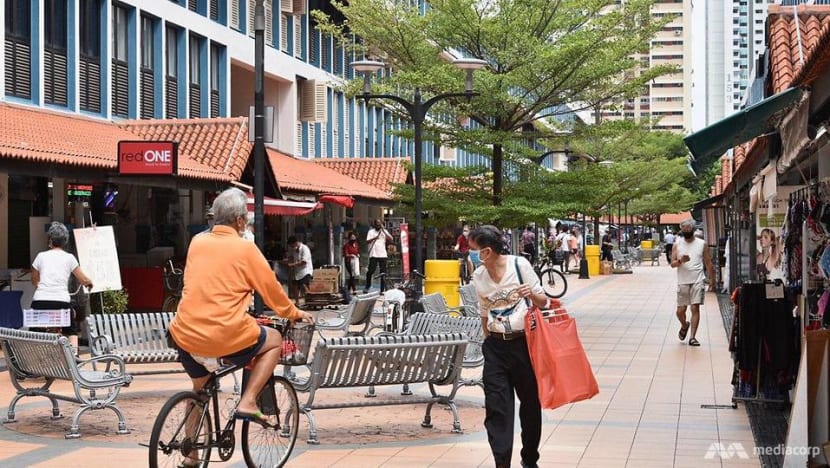Commentary: What Singapore can expect from Budget 2024
Whether or not Budget 2024 will be seen as help with the cost of living or goodies before a General Election, we should pay attention to how it advances the shared national vision, says the Lee Kuan Yew School of Public Policy’s Terence Ho.


This audio is generated by an AI tool.
SINGAPORE: Will Budget 2024 be a “General Election budget”? Speculation is inevitable as Singapore’s leadership transition looms.
Businesses and households will certainly be looking out for further help with costs when Deputy Prime Minister and Finance Minister Lawrence Wong delivers the Budget statement - themed Building Our Shared Future Together on Friday (Feb 16).
Whether government support is ultimately seen as help to alleviate cost-of-living pressures or as goodies to soften the ground before an election, Budget 2024 is expected to be a Forward Singapore budget.
The Budget speech lays out the government’s priorities, plans and programmes each year. It should not be viewed in isolation, but as building on previous efforts over several years across various policy domains.
This year’s Budget will give substance to the plans outlined in the Forward SG report released in October last year. The report was a culmination of a 16-month-long public consultation and engagement exercise spearheaded by the People’s Action Party’s fourth-generation (4G) leadership.
At the heart of this is Singapore’s social compact - the set of mutual obligations among members of society towards one another - and how it will be renewed in the coming years.
A FORWARD SG BUDGET
The Forward SG recommendations are centred on opportunities, assurance and collective responsibility. Among the key policy shifts identified are embracing learning beyond grades, and respecting and rewarding every job.
Specifics that may be announced include a top-up to SkillsFuture Credit, training allowances for mid-career Singaporeans pursuing longer, full-time training programmes, as well as support for Singaporeans with diploma or higher qualifications to obtain another publicly funded diploma.
The Forward SG report outlines further support for graduates from the Institute of Technical Education (ITE), who could soon receive help to defray the costs of obtaining a diploma and get a head start to purchase a home or save for retirement.
Another key plank of Forward SG is assurance for families, seniors and the lower income. The report adds to a slew of initiatives in recent years to strengthen financial support and assurance for these segments of society.
Budget 2024 could see details of enhancements to Workfare, the Silver Support Scheme and the Matched Retirement Savings Scheme, all of which contribute to building up retirement savings and cashflow for lower-income Singaporeans. Specifics of the new Age Well national programme for seniors may also be forthcoming.
While the national Budget can fund government programmes to advance the Forward SG agenda, success depends on the commitment of the rest of society.
The government can provide wage offsets to incentivise the hiring of seniors and persons with disabilities, but it is incumbent on employers to redesign jobs and give opportunities in the first place.
Changes to school curricula and the adoption of full subject-based banding attempt to shift emphasis away from academic performance, but students and parents also have to wholeheartedly embrace learning beyond grades.
Government programmes are only effective when they catalyse or reinforce a broader society effort towards the shared vision that Forward SG has helped to crystallise.
MEET SHORT-TERM NEEDS, INVEST IN THE FUTURE
Still, the issue top-of-mind for citizens, households and businesses will be the higher costs arising from the increased price of energy, water and raw materials, higher land and manpower costs, as well as hikes in the carbon tax and Goods and Services tax. Budget 2024 will almost certainly have to address this challenge.
Help is already available through the S$10.4 billion (US$7.7 billion) Assurance Package for Singaporeans and a suite of business grants for firms. Further support is likely on the cards in Budget 2024.
The challenge now is to wean individuals and firms off ad hoc grants and handouts so as not to entrench expectations or engender a permanent dependence on government.
Immediate help must therefore be paired with investment to raise the earning potential of citizens and the capabilities of businesses.
Workers are facing the brunt of a more volatile business environment. What's on their Budget 2024 wishlist? Listen to CNA's Heart of the Matter:
For individuals, this means the building of strong learning foundations in the schooling years, retraining and reskilling through life, and help with job matching and career transition. For businesses, this could mean help with the green transition and digitalisation, securing investments as well as capturing opportunities abroad.
Structural measures to keep business costs and the cost of living manageable are also critical. These include ensuring an adequate supply of land and housing in anticipation of future needs, diversifying food and other import sources, managing healthcare costs and ensuring cost-effectiveness in the provision of public services.
SPENDING WELL
How much the government disburses to households and citizens through the Budget depends on both needs and the availability of resources, quite apart from whether an election is imminent.
The seven-hour debate in parliament on Feb 7 on the use of national reserves focused on how much is appropriate to spend from investment returns on the reserves. In fact, how the government spends is as important or more than how much it spends.
Countries that spend more than Singapore on education and healthcare as a percentage of gross domestic product do not necessarily obtain better outcomes in educational or health outcomes. The key lies in spending efficiently, by designing public programmes that are evidence-based and aligned with individual incentives.
Upstream intervention in areas such as education, healthcare and crime prevention can produce better outcomes while saving on costly downstream expenditure. For instance, the KidSTART programme supports lower-income families to give young children a good start in life, while Healthier SG promotes healthy living and preventive care.
Government spending should also aim to crowd in rather than crowd out the efforts of the private and people sector.
A SHARED NATIONAL VISION
The Budget is by no means a straightforward exercise. It must address current needs, especially those of our seniors and the less well-off, while investing in people and infrastructure and setting aside enough to meet future contingencies in a volatile and uncertain world.
Getting this balance right is the essence of politics and public policy. With 18 months at most remaining in the current term of government, the upcoming Budget is an opportunity for Mr Wong and his team of 4G leaders to lay a marker for the future and rally Singaporeans around a shared national vision.
Whether or not Budget 2024 is an election Budget, this vision will be on the ballot at the next polls.
Terence Ho is Associate Professor in Practice at the Lee Kuan Yew School of Public Policy. He is the author of Governing Well: Reflections on Singapore and Beyond (2023).


















